|
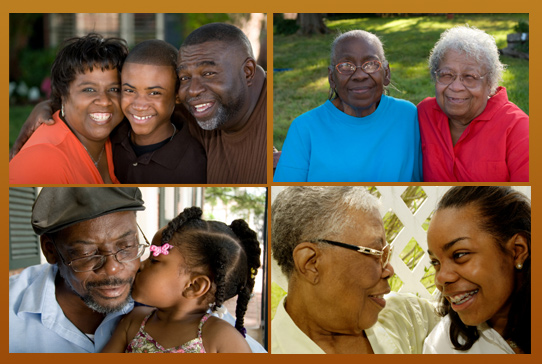
SENIORS, ELDERS, AND GRANDPARENTS DAY
CULTURAL RESOURCES
Sunday, September 12, 2010
Bernice Johnson Reagon, Lectionary Team Cultural Resource Commentator
I. Introduction
Leviticus 19:32—Rise in the presence of the aged, show respect for the elderly and revere your God. I am the Lord.
The scripture for this moment is clear. It calls us to acknowledge those among us who have been members of the strength and building of our community for decades beyond the bloom of their youth.
Etymology Notes1
Acknowledge: from the 1550s, a blend of Middle English aknow from the Old English oncnawan “understand,” from on+cnawan, “recognize” and the Middle English verb knowlechen “admit.” In the merger of the two terms, “kn” became a simple “n” sound as in “know,” the “c” preserves in this word, the ancient “kn” sound.
Honor: another term used in relationship to acknowledging the presence or debt is from circa 1200, glory, renown, fame earned, from Anglo-Fr. Honour, from Old French honor, from the Latin honorem, “honor,” dignity, office, reputation. The verb is recorded from late 13th century in the sense of “to do honor to;”
Wisdom: Old English from wis (wise as the adjective to dom). Old Norse visdomr, Old High German wistuom, related to German Weisturn “judicial sentence serving as a precedent.” What we call Wisdom teeth from 1848, earlier teeth of wisdom 1668 is a translation from the Greek sophronisteres, from sophron, meaning prudent, self-controlled, so called because wisdom teeth usually appear ages 17-25, when a person reaches adulthood.
One More River to Cross
Keep a stepping, it’s a wide--- river
One more river to cross
Keep a stepping, it’s a wide ---river
One more river to cross2
With every day, every step, every challenge, every river crossed, if we are blessed, we mount up the days until the young began to turn to us looking up for the cover that comes with a life that has climbed the mountains and waded deep waters and moved down and up through low valleys. Whether the snow is revealed or colored on our heads, whether a head full or hair or bald, a community is stronger if among its numbers there are those who are our elders, grandparents, representing the collected wisdom of the culture. If we have those among us who are the seniors of our group, this scripture calls for us in our homes, schools, places of business, government, and in our communities of worship to be intentional about the myriad ways of honoring, acknowledging, and supporting our elders.
II. Moments of Honor and Respect in the Nation’s Capital
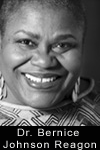 A. I live in Washington, DC and, nearing two decades past fifty, I recently had the experience of going to the motor vehicle division to take care of some business. I joined the line at 9:45 a.m. and was quite surprised and relieved when at 10:05 a staff member came outside and asked everyone over sixty years to follow him, and we were moved to the head of the line. I was surprised and grateful; in my quarter of a century plus years of doing business with city agencies this had never happened. A. I live in Washington, DC and, nearing two decades past fifty, I recently had the experience of going to the motor vehicle division to take care of some business. I joined the line at 9:45 a.m. and was quite surprised and relieved when at 10:05 a staff member came outside and asked everyone over sixty years to follow him, and we were moved to the head of the line. I was surprised and grateful; in my quarter of a century plus years of doing business with city agencies this had never happened.
We were in the early days of a new administration, and one elemental change in the way in which citizens were to be treated when conducting city business was that of providing special understanding, support to elder citizens. Also, as the recession hit, I got my Senior Metro card that allowed me to get a discount for taking public transportation. As I got on the first bus, with my cane, the driver lowered the step; all Metro buses have been renovated to accommodate wheel chairs and, on the Metro trains, there were seats set aside for seniors just as one entered the car. It was gratifying to experience that my city was looking for ways to extend new avenues of support to those of us who were now Senior citizens.
B. On another recent occasion, I left my home in northwest Washington to catch the Georgia Avenue bus downtown. As I walked with my cane down the sidewalk, three young men walking three across, engaged in conversation with each other, were coming toward me filling up the entire sidewalk. I geared up inside and decided I was going to say good morning and stay on what would normally be my side of the sidewalk. As they neared me, without breaking his stride, the young man facing me stepped behind his friends leaving my side open and, as I passed, they all stopped and said, “Good Morning,” and I responded “Good Morning.” We passed and continued on our way and I felt a glow and hope inside. It is the little things sometimes that reflect the health of a community, school, or church.
III. Taking the Words of Lev. 19:32 Seriously – Rising for Elders
Adisa Douglas shares that to this day, whenever an elderly person walks in a room, she immediately stands:
…Sometimes if I am with others, I look around, and I am the only person standing other than the man or woman who has just walked in. While there are a few seconds of awkwardness as the people in the room look at me with the question on their faces of “What is she doing?”, I continue to stand. My parents taught me to do this out of respect, and I decide in these moments that I am not about to sit down. Of course, there are also times, when other people in the room have been taught the same thing and it is only awkward for those who have not stood up. I don’t even have to think about it; it is something I have done since I was a child.
I was one of eight children of The Reverend Julius T. Douglas and Helen D. Douglas. My father was a Presbyterian minister and a Civil Rights leader. When we moved from Cincinnati, Ohio to Greensboro, North Carolina in 1946, my twin brothers were two years old. One of our favorite elder visitors was Mr. Alonzo Douglas, an elder in our church and a neighbor. He was one of my father’s few close friends. When Mr. Douglas, or any older adult, came to the house, it didn’t matter what we were doing, we were quickly on our feet! Each of us gave Mr. Douglas a big hug, and we were allowed to stay in the living room for a few minutes of his visit. Mr. Douglas would look at my parents and say, “The children show such wonderful respect.” We loved when he said this. I now realize that he was giving us children positive reinforcement for our behavior.
As an adult and now an elder myself, I try to imbue this value of respect for elders in young people. When I am with them, and an elder walks in the room, I love using my voice and power of being the old person, to let them know they need to be on their feet! This is a small thing, some would say, but for me, it is recognition of someone being around for a while and deserving respect.3
Tosu Tosalim shares that within Yoruba sacred traditions things move on a five day cycle and, for a sense of balance, every five days younger members of the community moving toward their place as adults go to an elder with whom they can share whatever is going on in their lives. This would be an elder known for her or his knowledge of the sacred teachings, the history of the village, one who has demonstrated in the way they lived that they were concerned for the welfare of the entire village, giving particular concern and attention to the needs of the younger members of the community who are moving year by year toward the time when they will hold a heavier load in the development of the community. These elders are known for being wise and trustworthy. With no personal ax to grind, they make time to listen, sometimes questioning you gently, supporting you as you try to sort out directions and paths through the many issues you face in your life. This elder does not tell you what to do, but teaching through stories and parables sometimes is able to assist in helping one to see his or her situation in a different light…4
For several years, Akua Opokuwaa has made Ghana her home for a substantial part of the year. She shares some of the many ways elders are honored, respected and called into service within their communities:
In Ghana, I constantly experience elders coming into meetings, funerals, festivals and recently in a church service and everything stops and waits for them to be properly seated. Properly seated means there is a place for them in the gathering that is most comfortable and which puts them at the center of the gathering even if it means moving a younger person to another seat. Elders in age as well as status must sit in a prominent seat. If one is not available, some poor soul has to be moved, even if they did arrive early enough to get the best seat. In one instance, I saw a young fellow get strong treatment at the “all hands” meeting at the village because he protested moving from his seat. He was "hands on” removed from the area to stand outside of the meeting space.
Whenever a serious topic involving any matter in the community is presented, invariably, arrangements are made to ensure that the oldest member of the village, who may have some historical information to contribute to the topic, is in attendance. That person's input almost always changes the tide of the decision making since the historical perspective is valued more than the contemporary perspective in our village. Yes, we are trying to get on board with contemporary issues and changes, however, not in such a rush that the values of our ancestors are ignored.
Today, right now, at the shrine festivals, if an elder starts a song or takes the song, people are ecstatic and vigorously join in. If an elder gets up and begins to dance, the drummers and singers "revv it up"...not to out-do the elder but to support. It’s a beautiful thing.
I am considered an elder both in status and in maturation. When the elder gets winded in dancing, someone will come and tap them out of the dance by hugging them and escorting them back to their seat. (you pray that they don't take too long :)!)In fact, usually when an elder speaks or dances, someone is standing or dancing with them…not in front but behind and in support of them. When an elder starts a song and forgets some of the words, with love and great honor someone joins to help them through that spot. These moments become the “talk” and highlight of the festival as the account is passed around. There is a singer in my Shrine, much older than myself, she'll start the singing, I take the song, she takes it back, and it is my duty to jump in to help if she raises the song. If she releases it, then I can pass it on to someone else; if she takes it back at any point, it is the joy and talk of the day.5
IV. Senior Ministries
Many contemporary churches have as a part of their ministry a number of programs and support services created to serve the needs of their members as they grow older. This ranges from purchasing vans and training drivers to be sure the seniors in their congregation have access to transportation to get to church services and in many cases can call for assistance to get them to their medical care appointments, and being sure there are home visits for communion. In some larger congregations, there is a member of the ministerial staff whose primary assignment is guiding the Senior Ministry of the church.
Growing up in a large family in mid-twentieth century rural Dougherty County, Southwest Georgia, where the entire family often accompanied my father, a Baptist pastor of four (4) small churches, I do not remember a specific day in my community or my church that was set aside to honor our elders. Our elders had a special place in the service; they sat in the Amen corner, men to the left of the pulpit and women to the right.
Today many churches have ministries and services for those who in their senior years need more support in a fast pace and expensive world. The Sunday bulletin lists those members who are ill or home-bound and unable to attend services, with addresses with the urging that they be remembered and that others reach out to them.
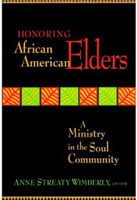 In 1997, Anne Streaty Wimberly published Honoring African American Elders: A Ministry in the Soul Community. This work, a collection of essays edited by Wimberly who also authored several of the essays, provides definition, place and plans that congregations can use in making the richest use of one of their most valued resources—their elders. Stating the urgency of the work, Wimberly noted that in many congregations, elders are the largest group. The need to increase focus on this crucial and faithful group within the African America Church community takes study and planning. Clarifying the focus, Wimberly writes:
In 1997, Anne Streaty Wimberly published Honoring African American Elders: A Ministry in the Soul Community. This work, a collection of essays edited by Wimberly who also authored several of the essays, provides definition, place and plans that congregations can use in making the richest use of one of their most valued resources—their elders. Stating the urgency of the work, Wimberly noted that in many congregations, elders are the largest group. The need to increase focus on this crucial and faithful group within the African America Church community takes study and planning. Clarifying the focus, Wimberly writes:
To speak of honoring African American elders in the context of the soul community means to voice a commitment to embody the values of honor and soul community in everything we do. We regard elders as important bearers of history and culture, and we value and assure their place in the community as contributors and receivers of care.6
Defining soul community, Wimberly states:
The concept of soul community attempts to capture the unique qualities of African American Christian congregations that are not found in other Christian congregations. The communal concept of soul … is an important aspect of African American style of life in general and the African American congregation’s way of being a people of God in particular.
7
Reviewing Wimberly’s book, Presiding CME Bishop Thomas L. Hoyt, Jr., ( Fourth Episcopal District of Louisiana and Mississippi) wrote: “A people’s moral barometer is gauged by treatment of their children and the elderly. This book challenges urban and rural communities to honor their elderly through ministries governed by biblical, historical, spiritual, psychological, physical, pastoral, and socio-economic sensitivities. It advocates for the elderly to share their gifts and is a 20th century book which prepares communities to respond morally toward the elderly now and in the 21st century."8
For examples: See the following two churches and what they identify as services structured as key to their Senior Ministry.
Abysinnian Baptist Church, located in Harlem, NY, pastored by Reverend Dr. Calvin O. Butts, III, their Senior Ministry includes:
*Praying Band Service at 8:30 AM on Sunday mornings
*Monday Senior exercise class before the 12 noon Bible study
*An Alzheimer’s Support Group meeting for those who have members in their
families who live with this disease.9
Metropolitan Baptist Church, located in Washington, DC pastored by Reverend Dr. H. Beecher Hicks, Jr., has a Hearts and Flowers Senior Ministry with a Senior Ministry Minister on staff.
The Hearts and Flowers Ministry is both an in-reach and outreach ministry. This ministry is affiliated with other senior groups under the umbrella of the National Council of Senior Citizens, Washington, D.C. branch. This ministry includes members inside and outside the Metropolitan membership family. Hearts and Flowers addresses Christian Awareness, Health, Safety, Fellowship and Service. Activities at Metropolitan include:
*Tours, lectures, trips to the theater and shopping trips
*Luncheon Meetings: Every 2nd Thursday from 12:00 p.m. until 2:00 p.m.
*Annually a catered dinner in honor and celebration of all seniors is held at a
local hotel restaurant; and
*Transportation to church services and special church meetings is provided.10
V. Where Family Eldership and Honor Holds True
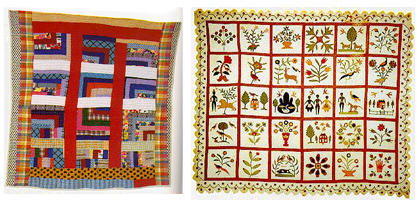
A Healing Quilt, Candles, Prayers and the Bible
Author, photographer, quilt collector and designer, Roland Freeman, tells the story of a healing quilt that his great-grandmother used when he was ill. She always used the quilt with candles, a bitter hot tea, and reading from the Bible. It did not go over well with the hospital staff, but was healing for him. He found later that the cloth used in making the quilt was from his nineteenth century great-great grandmother and her sisters.
In March 1945, when I was eight years old and in the hospital with pneumonia, my grandmother Goldie and my great-grandmother Arbia came to visit and brought the healing quilt. After covering me with the quilt, my great grandmother lit a candle and started to read from the Bible. My grandmother took out a thermos of tea and was helping me sip it. A young nurse came into the room, and with a curious look on her face inquired about the strange smell. My grandmother ignored her, so the nurse left and soon returned with a doctor and another nurse. The doctor angrily demanded to know what they were feeding me. My grandmother answered, “I know what I’m doing. I’ve been taking care of people for years.”
The doctor asked Goldie and Arbia to step outside the room, and I could hear them arguing. Then the doctor said he didn’t want any of that “hoodoo mess” in this hospital and asked her to leave quietly. When they came back into the room, he took the quilt off me and gave it to my grandmother, telling her to take the “stinking thing” away. She was so mad I thought she was about to cast a spell on them, but all she said was, “if anything happens to my grandson, I’ll get all of you.” She and Arbia then kissed me and left. It could have been my imagination, but it seemed that just having that quilt on me made me feel better.
…During the winter of 1946 I got sick again. My mother wanted to take me to the hospital, but my grandmother insisted that she would take care of me. I remember my great-grandmother Arbia telling her that she was going to put the healing quilt on me. This quilt had big bold patterns, all red and black. The two of them sprinkled stuff from several bottles onto the quilt and lit three candles. My grandmother brought me hot, bitter tea, and my great grandmother read to me from the Bible. They worked on me for three days, bathing and feeding me and praying until they broke my fever.11
VI. Prayers For New Elders
During the 1960s, one the Civil Rights organizations formed to fight racism and segregation within the Southern section of this country was comprised of students, many of whom dropped out of school to do dangerous civil rights organizing work. In April 2010, many of the surviving freedom fighters traveled to Shaw University for a 50th reunion of the founding of the organization on that campus. Reverend Ruby Sales, who as a young college student, joined the work in Alabama, sent out this prayer to those preparing to come together to honor the struggle and their contributions: “I enclose this prayer that has much in it about honoring elders, I wrote it to remind us in the best tradition of the elders that prayer was essential to their rising up and sitting down. Fifty in Biblical terms is the age of maturity where you come out the wilderness. This prayer is to call us back into community and remind us that the local elders within the many communities we served were the solid rock upon which the Movement built itself—as we honor the work and accomplishments, we are honoring them.”
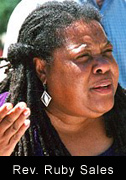
Oh God who lives and acts in human history - who stands on the side of the poor and forgotten - we thank you for your witness and assurance that “no lie can live forever.”
We thank you for planting within us a deep impulse for freedom and a capacity for justice that is a steady stream that refuses to be stilled by the hands of injustice and state terrorism or lies.
We thank you for the Movement breath that still runs throughout our lives. God strengthen us in a land and period of history where it is difficult to catch our breaths in the stench of rampant injustice and materialism.
This morning, we pause to thank you for bringing SNCC a mighty long way. Continue to “guide our footsteps” and remind us in our moments of doubt, despair and grief as we approach the riverside of our journeys that our lives and struggle for freedom are not in vain.
This morning in this circle, we remember and offer gratitude for how you stood with ordinary Black people during the travail of segregation. You gave them the courage and vision to keep building up generations even when there was no evidence in the daily ravages of segregation that their work would bear fruit. But they kept on praying, working, imagining and educating their children.
God, we recognize this morning that SNCC members are inheritors of this tradition. Thanks be to God.
We are witnesses and benefactors of the love that these ordinary people poured out into us who were their heirs by blood, through history, common beliefs and our common connections as “children of God.”
We thank you for their courage. We thank you for gifting them with a theology of somebodyness and resistance that enabled them to rear children who did not break and despair from the weight of segregation.
In our humbleness this morning, we remember that it was their power and faith that set the framework for the freedom struggle. Help us to celebrate and call up the names of these ordinary but soulful people who brought down a dangerous Empire without firing a shot.
Their courage enlarged our own courage and offered examples of the power of prayer even when we as youth thought that they prayed too much and bent too often and too low to a God whom we felt had deserted Black people far too often and too long.
Many of them lie stiff in graves throughout the South; help us to raise them and their lives out of ashes and dust into their places in human and Meta history.
As we move fifty years later towards Raleigh, our starting point as a community, may their spirit and faith coupled with our adult understandings and recapitulations abide within us and move and bind us together in a common resolve to tell the stories of how we as a community of young people survived and transcended the daily assaults on our lives by a community of people who believed that you were on their sides as oppressors.
God, many of our SNCC friends have answered the call of death - let us raise up their names so that the world remembers in history and Meta history that there was once a generation who heard the call of freedom and answered it despite the snares and dangers of White terrorism, and our personal and communal grief and wounds.
God of Fannie Lou Hammer, Victoria Gray Adams, Jonathan Daniels and Samuel Younge, enable us to hear the words they whisper in our ears - let them be a part of our getting up and sitting down at a 50th anniversary which belongs to them too.
God, we would be remiss as a community this morning if we do not pause to thank the committee that called us into remembering and celebrating our 50th year. For those of them who stepped out to take on this task, we thank them for their daring and labor. We recognize that their call gives us an opportunity in community to trim off the excessive spiritual and social weight that all of us have picked up on our journeys.
God, as we prepare ourselves for this momentous social and spiritual moment of collective and individual reflections, let us recognize our starting points as well as our youthful courage and resolve to stay on the freedom train in a world that feasted and grew fat on our work while often disregarding us and the sacrifices that each of us made in our own ways.
Where there is righteous indignation, help us to acknowledge and stand firm in it.
Where there is bitterness, root it out with the words of our ancestors who reminded us that hate and bitterness destroy our inner and outer lives.
Where there is brokenness, help us find a balm in Gilead.
Where there is disagreement, smooth our tongues so that we might dissent with a vigor that is deeply punctuated with love and regard.
God give us the wisdom to understand that there is still so much work to do and so much to still say.
Push aside our egos and old battles so that we “go tell it on the mountains, over the hills and everywhere” that the power of the people united in struggle is stronger than oppressive governments.
Help us to turn our reflections in Raleigh into a collective document that is useful beyond our circle - let it be a reminder of people who believed in you as the solid rock in their lives showed the world that with the faith of a mustard seed, dispossessed communities everywhere can collectively move the mountain of injustice and move on up a little higher toward freedom.
It is on this faith that I petition you and remind SNCC today that we can move the mountains that stand in our way of being community and sisters and brothers who still stand believing and still hoping. God, we pause this morning to give thanks to the mothers and fathers upon whose faith we still profess a burning fervor for freedom that still glows despite our disappointments.
As I close this prayer this morning, I want to thank you God for carrying me on your back through the years of trauma from Jonathan’s assassination that was almost too much for my youthful heart. God you brought me out of years of silence and grief to speak again and to be in a reasonable portion of my mind -to stand in this circle of survivors and remnants to whom you have given the task of keeping the world’s “mind stayed on freedom.”
Blessed be!12
VII. Songs for This Lectionary Moment
Old Time Religion
Give me that old time religion
give me that old time religion
Give me that old time religion
It's good enough for me
Other lines:
It makes me love everybody… (Repeat 3xs)
It’s good enough for me.
It was good for the Hebrew children…(Repeat 3xs)
It's good enough for me
It was good for the Prophet Daniel…(Repeat 3xs)
It's good enough for me
It will do when I'm dying…(Repeat 3xs)
It's good enough for me.13
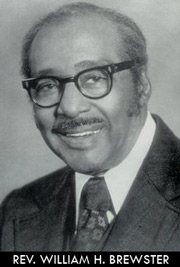 William Herbert Brewster, Sr. (1897-1987), pastor, gospel songwriter and educator wrote “Old Landmark,” it became one of the most popular songs of the classic gospel era after being recorded by Clara Ward and the Ward Singers from Philadelphia, Pennsylvania. In the text of this song, Brewster reminds the church if you get confused on your journey, there is a way forward if we go back to the place and time when we knew who were and what we were doing and start again. Having elders in our midst as a source of experience and knowledge of the way we have journeyed and listening to them and learning from their “moving through”—can provide rich sustenance as we search for ground under our feet to move forward creating a new future. William Herbert Brewster, Sr. (1897-1987), pastor, gospel songwriter and educator wrote “Old Landmark,” it became one of the most popular songs of the classic gospel era after being recorded by Clara Ward and the Ward Singers from Philadelphia, Pennsylvania. In the text of this song, Brewster reminds the church if you get confused on your journey, there is a way forward if we go back to the place and time when we knew who were and what we were doing and start again. Having elders in our midst as a source of experience and knowledge of the way we have journeyed and listening to them and learning from their “moving through”—can provide rich sustenance as we search for ground under our feet to move forward creating a new future.
Old Landmark
Chorus
Lead: Let us all…
Response: All go back,
Lead: To the old…
Response: Old landmark (pattern repeated3x)
Then, we’ll stay in the service of the Lord.
Verse 1:
Let us kneel and pray in the old-time way…
Let us kneel and pray in the old-time way,
Let us kneel and pray in the old-time way,
He will hear us and be near us,
We’ll be given bread from Heaven,
He will feed us until we want no more.
Verse 2:
Preachers preach the word in the old-time way,
Preachers preach the word in the old-time way,
Preachers preach the word in the old-time way,
Tell the story of His glory,
It will warn men, it will turn men,
It will save this old world from sin and shame.
Verse 3:
Let us blend our voices in the old-time way,
Let us blend our voices in the old-time way,
Let us blend our voices in the old-time way,
Common meter, they’re much sweeter,
When you stop singing, bells keep ringing,
It will linger right down in your soul.
Verse 4:
Let’s go down to the river in the old-time way,
Let’s go down to the river in the old-time way,
Let’s go down to the river in the old-time way,
Sons and daughters buried in the water,
Coming up shouting, nobody doubting,
Everybody happy in the service of the Lord!
He will hear us and be near us,
We’ll be given bread from Heaven,
Tell the story of His glory,
It will warn men, it will turn men
Common meter, they’re much sweeter,
When you start singing, bells keep ringing,
Sons and daughters buried in the water,
Coming up shouting, nobody doubting,
Everybody shouting, shouting, shouting, shouting!14
Notes
1. Harper, Douglas. Online Etymology Dictionary. Online location: http://www.etymonline.com/ accessed 19 February 2010
2. “One More River to Cross.” Traditional song text.
3. Adisa Douglas, personal written account, used by permission of author. 1/12/2010.
4. Tosalim, Tosu. Yoruba priest. Personal Interview. Atlanta, GA: 27 January 2010. Used by permission.
5. Opokuwaa, Akua. 15 December 2009. Used by permission of author.
6. Streaty Wimberly, Anne, ed. Honoring African American Elders: A Ministry in the Soul Community. San Francisco, CA: Jossey-Bass Publishers, 1997. p xiii.
7. Streaty Wimberly, Anne, ed. Honoring African American Elders: A Ministry in the Soul Community. See Chapter One.
8. The National Black Congress. “Black Authors: Anne Streaty Wimberly.” Online location: http://www.nbccongress.org/publications/black-authors/anne-streaty-wimberly.asp accessed 19 February 2010
9. The Abyssinian Baptist Church in NYC. Online location: http://www.abyssiniannyc.org/index.php?l=1 accessed 19 February 2010
10. Metropolitan Baptist Church. Online location: http://www.metropolitanbaptist.org accessed 19 February 2010
11. Freeman, Roland. A Communion of the Spirits, African American Quilters, Preservers, and Their Stories. Nashville, TN: Rutledge Hill Press, 1996. pp. 5, 7-8.
12. Prayer by Reverend Ruby Sales honoring those now elders who were in their youth during the sixties Freedom Movement. Used by permission of the author.
13. The Caravans and James Cleveland. “Old Time Religion.” Online location: http://www.youtube.com/watch?v=Sxk3NJWngm0 accessed 19 February 2010
14. “Old Landmark.” By William Herbert Brewster.
|